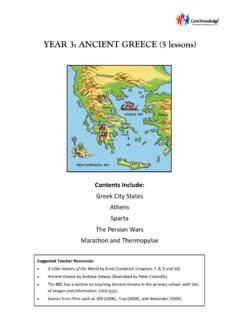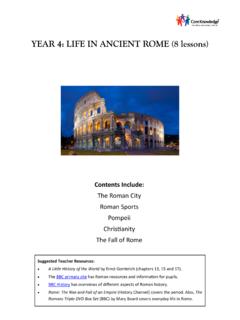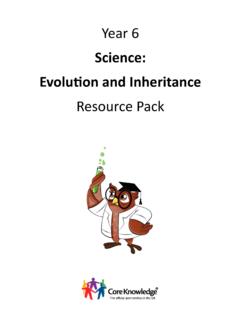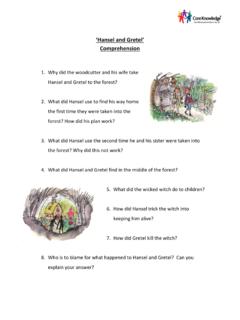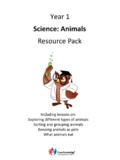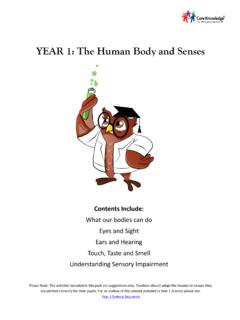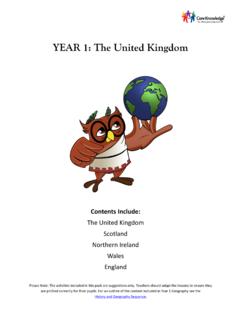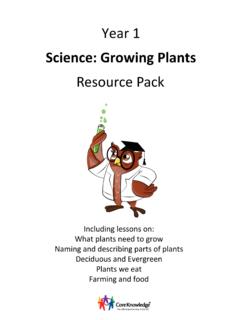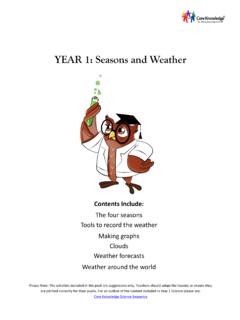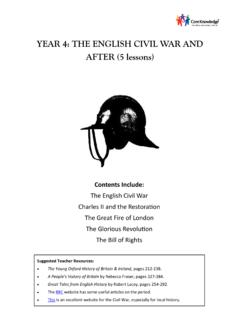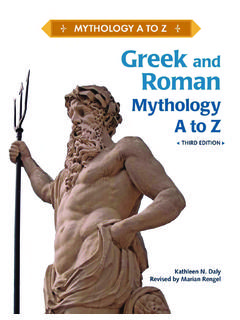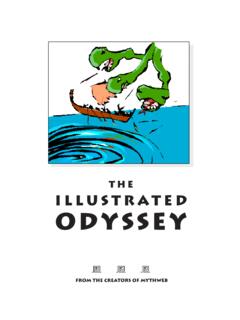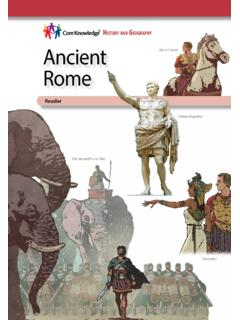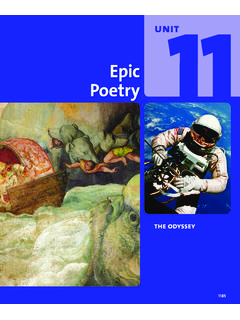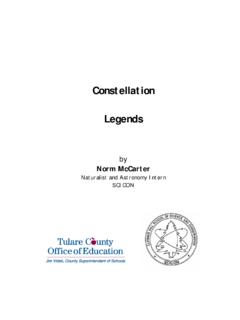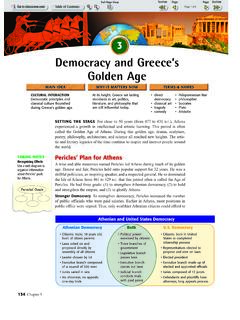Transcription of YEAR 3: ANCIENT GREECE- UNIT 2 (5 lessons)
1 YEAR 3: ANCIENT GREECE- UNIT 2 (5 lessons). Contents Include: greek Philosophy The Rise of Alexander the Great Alexander's conquests The death and legacy of Alexander Suggested Teacher Resources: A Little History of the World by Ernst Gombrich (chapters 7, 8, 9 and 10). ANCIENT Greece by Andrew Solway (illustrated by Peter Connolly). The BBC has a good section on teaching ANCIENT Greece in the primary school, with a good range of images and information. Click here. Scenes from films such as 300 (2006), Troy (2004), and Alexander (2004). Lesson 1. Great Thinkers in Athens The impact of ANCIENT Greece on Western Philosophy is hard to overstate. Whilst the Romans were more militarily successful with a greater Empire, the Greeks always retained intellectual dominance, founding the basic principles of science, mathematics and medicine.
2 This lesson should simply introduce the pupils to the idea that the greek philosophers liked to ask questions about life. This can be done through teaching them about the lives of the three most important greek philosophers, Socrates, Plato and Aristotle. All three studied in Athens, Plato as a pupil of Socrates, and Aristotle as a student of Plato. See pages 155-156 of What Your Year 3 Child Needs to Know. Learning Objective Core Knowledge Activities for Learning Related Vocabulary Assessment Questions To gain an The ANCIENT Greeks gave birth to Explain a potted biography of the three philosophy What does philosophy introduction to philosophy, meaning love of main greek philosophers, Socrates, Plato mean? greek philosophy wisdom'. and Aristotle. This, this and this from and the sorts of Horrible Histories may help. Then do an Who were the three questions it posed.
3 The three most important information sort about the three main greek philosophers of ANCIENT Greece philosophers (resource 7). Study the philosophers? were Plato, Aristotle and famous painting, The School of Athens. Socrates. What sorts of Challenge the class to come up with questions do They asked questions about what some of their own philosophical philosophers ask? it means to be a good person, questions, and write them into the how people should be governed, thought bubbles on a worksheet. and what is the nature of truth. Pose some simple philosophical questions to the class: What is stronger, love or hate?; Should only clever people rule a country?; Does money make you happy?; What does it meant to be happy?; Is it ever right to lie? 7. The greek Philosophers Learn about the lives of these three great philosophers, then try to group the five descriptions under the correct name.
4 SOCRATES PLATO ARISTOTLE. He is seen by many as He thought a lot about the father of modern He was born in 470 BC. government, and did not science. like democracy. He was the tutor to He was a student of famous greek ruler He was born in 428 BC. Socrates. Alexander the Great. He taught by always He believed the greatest He loved mathematics, asking questions the aim in life was to be and thought that people Socratic Method' good, or virtuous'. should be logical. He was executed by Founded the Academy'. He was a student of Athens for asking too in Athens the first ever Plato. many questions. university He had many ideas He was famously ugly . He was born in 384 BC. about what it meant to many said he looked like be a good person. a monkey. 7. The greek Philosophers (comp.). Learn about the lives of these three great philosophers, then try to group the five descriptions under the correct name.
5 SOCRATES PLATO ARISTOTLE. He was born in 470 BC. He was born in 384 BC. He was born in 428 BC. He taught by always He was a student of He was a student of asking questions the Plato. Socrates. Socratic Method'. He was famously ugly He is seen by many as He thought a lot about many said he looked like the father of modern government, and did not a monkey. science. like democracy. He believed the greatest He had many ideas He loved mathematics, aim in life was to be about what it meant to and thought that people good, or virtuous'. be a good person. should be logical. He was executed by He was the tutor to Founded the Academy'. Athens for asking too famous greek ruler in Athens the first ever many questions. Alexander the Great. university Lesson 2. The young Alexander Alexander the Great is one of the most important figures in the history of the world.
6 Born in 356 BC, he became king of Macedonia in northern Greece aged only 19. As a child, he was tutored by the great Athenian philosopher Aristotle in philosophy, poetry, drama, science and politics. Once he grew up to be king, Alexander combined great intelligence with fierce courage. There are many famous stories about Alexander's youth which told people of the king he was likely to become. One of them was the story of how he tamed a wild horse named Bucephalus, by noticing that the horse was afraid of its own shadow. See pages 158-159 of What Your Year 3 Child Needs to Know. Learning Objective Core Knowledge Activities for Learning Related Vocabulary Assessment Questions To understand how Alexander the Great is one of the This is a good summary of Alexander the Bucephalus When was Alexander Alexander's most important figures in world Great's life.
7 Macedonia the Great born? upbringing helped history. him to become a Read the story of how Alexander the Where was Alexander great king. Alexander was born in 356 BC in Great combined bravery and wisdom to the Great born? a small kingdom in northern tame the horse Bucephalus, and discuss Greece called Macedonia. His what it tells us about Alexander as a How did Alexander father, King Phillip II of Macedon, young man. This video shows Alexander tame Bucephalus at a had him tutored by the great taming Bucephalus. young age? Athenian philosopher Aristotle. Write an account of an eyewitness who What did Alexander According to legend, Alexander has seen Alexander tame the horse. taming Bucephalus tell tamed a wild horse which was Describe what happened, and predict us about the sort of afraid of its shadow, and named what sort of king Alexander is likely to be king he was likely to it Bucephalus.
8 On the basis of the event. be? Lesson 3. Alexander's conquest of Greece Alexander became king of Macedonia aged 19, and by the age of 21 he had conquered the whole of Greece. Alexander's ambition was without limit, and he was extremely cruel in his efforts to unite each of the greek city-states into one Empire. When the greek city-state of Thebes rebelled against Alexander, he burned the city to the ground and sold the population of 30,000 citizens into slavery. This sent a clear message to the rest of Greece that Alexander was not to be opposed. The story of the Gordian Knot, which Alexander untangled by slicing in half, is often told to illustrate Alexander's ruthless ambition. See pages 155-156 of What Your Year 3 Child Needs to Know. Learning Objective Core Knowledge Activities for Learning Related Vocabulary Assessment Questions To understand what Having become King of Re-enact the cutting of the Gordian knot Gordian knot How quickly did sort of military Macedonia aged only 19, in the classroom.
9 Prepare a tightly Alexander conquer the commander was Alexander conquered the whole tangled rope in which the ends are whole of Greece? Alexander the of Greece in just two years. hidden within the knot. Tell the class Great. that whoever can untie the knot, shall Was Alexander cruel in Alexander was ruthless in his have the world as their kingdom. Ask a the way he did this? conquests, burning the ANCIENT number of pupils to untie the knot. city-state of Thebes to the Hopefully, they will be unable to untie it. What was the Gordian ground and selling its population Then, choose one to act as Alexander, knot? into slavery. and cut straight through the knot with scissors (in place of Alexander's sword!). What can we tell In one famous story, Alexander about Alexander's was challenged to untangle a Write an account of an eyewitness who character by the story rope known as the Gordian has seen Alexander cut the Gordian knot, of the Gordian knot?
10 Knot'. He cut straight through it and predict what sort of king Alexander with his sword. is likely to be on the basis of the event. Lesson 4. Alexander's Empire From Greece, Alexander invaded North Africa, and then Asia, conquering more land for his greek Empire. The Persian Empire was the old enemy of ANCIENT Greece, and Alexander successfully took their land, killing King Darius III of Persia. The decisive event was the Battle of Guagamela, an amazing victory which saw the 26 year old Alexander's greek forces defeat a Persian army five times it size. From there, Alexander carried on to the Persian city of Persepolis, and all the way to the Indus river in modern day Pakistan and India. Through near constant battle, Alexander conquered much of the known world. See pages 155-156 of What Your Year 3 Child Needs to Know. Learning Objective Core Knowledge Activities for Learning Related Vocabulary Assessment Questions To understand the Having conquered the whole of Annotate a map of Alexander's victories, empire What did Alexander do geographical spread Greece, Alexander spread his so that pupils understand the geography Guegamela having conquered the of Alexander's Empire further, conquering Egypt of Alexander the Great's campaign Persopolis whole of Greece?
